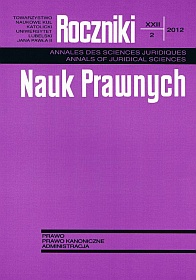Forms of Concluding Marriage with Civil Effects
Abstract
The entry into force of the Concordat on 25 April, 1998, made it possible to contract canon marriages in the Republic of Poland. Having satisfied the premises contained in Paragraph 1 of Article 10 of the agreement established with the Apostolic See, such marriage will have effects in civil law. The regulations pertaining to the so-called concordat marriage are further specified and adapted for immediate use in Article 1 Paragraph 2 of the Polish Family and Guardianship Code. The Code distinguishes two forms of concluding marriage: ordinary and extraordinary.
The ordinary form consists in contracting marriage which is subject to Canon Law in the presence of a qualified witness and two ordinary witnesses. Simultaneously, the wedded couple are obliged to make a declaration of will concerning the civil effects of their marriage. The issuance of a marriage certificate and update of the Civil Register are the final conditions that must be satisfied if a canon marriage is to have civil effects.
The extraordinary form can be used if either party’s life is in immediate danger. The marrying priest does not need to be presented with a certificate issued by a registrar. He must be content with a declaration that the parties are not aware of any circumstances which would prevent them from contracting marriage.
Copyright (c) 2012 Roczniki Nauk Prawnych

This work is licensed under a Creative Commons Attribution-NonCommercial-NoDerivatives 4.0 International License.


